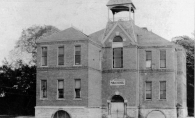The historic grand hotels of the late 1800s evoke regality, respect and awe. Images of men in tails and women in ball gowns float to mind when we reminisce about the good old days.
Hotels in the lake area were no exception. Parties and galas hosted by influential Americans are scattered throughout the history of Hotel Lafayette, a grand destination. Before the hotel burned down, it was the premier location of many a party, including the biggest bash the lake has ever seen. It was a party fit for presidents and nobility—but one that also ended in controversy and fed into the Prohibition movement.
On September 3, 1883, railroad baron James J. Hill celebrated the completion of the Northern Pacific Railroad by hosting an elegant 10-course banquet for 1,000 guests at his Hotel Lafayette “that made the triumph of a Roman Emperor pale in magnificence,” according to publicity at the time. Special trains from New York arrived for the occasion, full of royalty from England, military officers, nine governors, German nobility, nine generals, ex-President Ulysses S. Grant, sitting President Chester Arthur, architect Cass Gilbert and environmentalist John Muir.
Held in spite of a heated opposition from the local townships, the biggest bash on Lake Minnetonka was to be a large-scale celebration. The teetotalers had convinced city councils in both Excelsior and Wayzata to go “dry,” but Hill wouldn’t let the petty squabbles of these puritanical do-gooders halt his grand plans.
One German dignitary, Herr N. Mohr, wrote in his a diary (Streifzug durch den Nordwesten Amerika) about the fabulous event: “Lake Minnetonka and the Hotel Lafayette will from this day on be renowned, for it is assembling about itself a company which attracts the gaze of the whole United States… And the tables, ach Himmel! Never shall I see such long tables again during my life’s span! My hand goes lame at the faintest endeavor to describe such a banquet.”
But the elegant evening started to get rowdy when the drunken kitchen staff who had indulged in the good hooch began throwing plates. According to one source, the police stormed the kitchen to stop the kerfuffle but not before Grant was whacked with a pie plate and others suffered minor injuries from tea cups and champagne glasses. The local temperance societies—and owners of rival hotels—called for the Lafayette to be shuttered or else the “magnificent hostelry [could be] degenerated into a beer garden,” according to the Minnesota Tribune.
Famed activist W.E.B. Du Bois happened to be a busboy, and was appalled by the treatment of the wait staff at these grand hotels. One of the corpulent capitalists summoned the busboy to his table. “Thus Caesar ordered his legionaries or Cleopatra her slaves,” Du Bois wrote. “Dogs recognize this gesture... Then and there I disowned menial service for me and my people.” DuBois later went on to found the NAACP.
A journalist whose last name was Dimond panned the event, claiming that the food was mediocre and the wine subpar. Dimond wrote that the drunken brawl among waiters toward the end of the meal was indicative of the debauchery at these supposedly elegant establishments. He railed against Hill for his “open defiance of the Excelsior township no-liquor law.”
This debacle embarrassed Hill and rallied the Temperance movement to enforce the laws around the lake that allowed only beer and wine, but nothing served by the glass (in other words, hard liquor). Police arrested the Hotel Lafayette’s bartender several times for ignoring the rules. This elite crew, however, succeeded in keeping the liquor cabinets filled, and the profits from spirits kept these hotels and the accompanying steamboats afloat. For example, the City of St. Louis steamboat sailed 20 hours a day and earned an average of $1,500 per day from alcohol sales.
By 1897, Hill was losing money on the fabulous Hotel Lafayette and planned to tear it down the next year to avoid further losses. Right after the water was turned off for the year to prevent the pipes from bursting, a blaze ripped through the giant structure and burned the extensive five-story building, with its wide wooden porches. To this day, it has not been rebuilt and no hotels line the shore of Lake Minnetonka.









